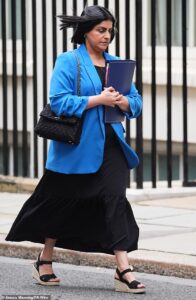Updated:
Parents with pupils in private school who pre-paid fees in advance of January’s VAT hike are facing a fresh attack from the taxman.
HM Revenue and Customs is set to probe so-called advance-fee schemes which swathes of parents used in a bid to avoid larger fees, it has emerged.
Advance fee or payment schemes have been in used in private schools for years but they began to surge in popularity as early as December, 2023.
They allow parents of students at private schools to pay upfront for tuition fees for future school years, often with a discount.
The pre-paid funds act like a deposit and are used to cover most of the fees each year, instead of locking in a price.

VAT had never before been charged on private school payments but Labour’s manifesto revealed it would scrap the exemption for private schools, which saw them free of the 20 per cent tax.
This came into force in January of this year in a bid to bolster the Treasury’s dwindling coffers.
Droves of families paid advanced fees for future school years before the change in January, hoping to avoid the VAT hike of up to 20 per cent.
Parents with pupils at the top 50 private schools in the country pre-paid fees to the tune of £515million last a year – up from £121million the year before.
This means that as much as £103million in tax may have been avoided in these top 50 schools alone.
However, their efforts may have been in vain as the tax office prepares a fresh assault on these prepayments to ensure all private schools pay their ‘fair share’.
Official sources said HMRC will now ‘carefully scrutinise’ prepayments, the Telegraph reports.
These fees paid in advance may still be liable for VAT because of the way the schools structured the schemes.
The taxman is likely to target schools that use the advance fees like a deposit or those quickly set up such a scheme ahead of the VAT hike. Investigations could take several years to complete.
Tax experts have warned VAT applies to the year fees are invoiced so there’s a chance the prepayments didn’t work in the way parents had hoped.
It means parents who used these pre-paid fee schemes to mitigate the impact of the VAT hike could be liable for unpaid VAT.
It could also not only spark lengthy legal battles between the tax office and private schools, but also between parents and schools over who is liable for the potential tax bill.
Chancellor Rachel Reeves attempted to curb such schemes by applying VAT to pre-paid fees made from July 29 last year.
But parents had already funnelled millions of pounds into the schemes to avoid the punitive tax measures.
Alex Pugh, financial planner at wealth manager Saltus, said that many parents started to make strategic decisions including advance fee payments back in December 2023.
He said: ‘However, it seems that the efficacy of these schemes is now in doubt, as VAT may still be due on these prepayments. Two in five parents will make a change to their child’s private education before term starts in September.
‘As this number may well rise if it transpires that those who thought they’d avoided the VAT through pre-payments are still liable, professional advice is key.
‘Should HMRC successfully unravel advance fee schemes, the financial pressures facing all private schools will be exacerbated.
‘In an attempt to avoid the VAT liability parents may claim they were misled about the tax benefits of advance schemes, potentially sparking long-running, costly legal battles with schools.
‘Such disputes could result in the schools themselves ultimately being liable. The full impact of this tax change cannot be avoided.’
A government spokesman said: ‘The Office for Budget Responsibility has already factored in the increased use of pre-payment schemes in its revenue forecasts.
‘Removing tax breaks for private schools is expected to raise £1.8billion a year by 2029/30.
‘This funding will help us recruit 6,500 new teachers and improve standards in state schools, which educate 94 per cent of children.’








